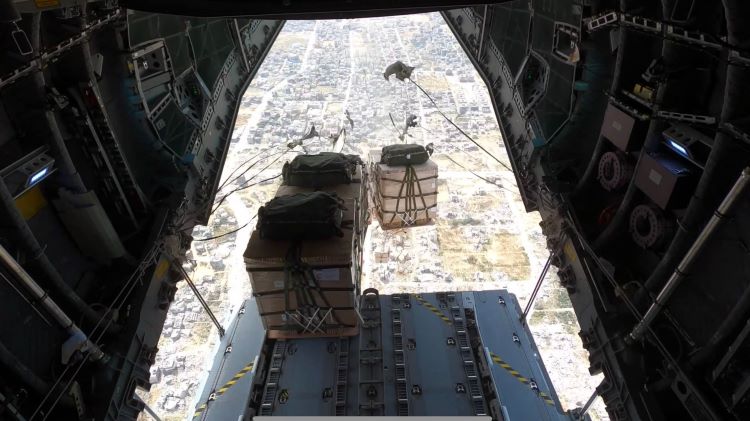Eduardo González
Spain and Jordan coordinated yesterday, with financial help from the European Union, the air drop of 26 tons of food to the Gaza Strip, which was carried out from the two A400 planes that took off the previous day from the Zaragoza Air Base with material of humanitarian aid.
The operation was launched jointly by the Ministries of Defense and Foreign Affairs “in the context of Spain’s commitment to the civilian population, which suffers the consequences of the conflict unleashed after the Hamas terrorist attack on October 7,” according to reports from the two departments in a press release.
Yesterday morning, 26 tons of humanitarian aid was launched, consisting of more than 11,000 food rations. The operation has been coordinated with the Jordanian authorities and is co-financed by the European Union and nearly 40 soldiers have participated, from the Operations Command, the Joint Air Command Center (JFAC), and the Air Deployment Support Squadron (EADA) and Air Mobility Headquarters (JMOVA).
Despite this air shipment, the two Ministries insist, in their press release, on the need to open the land border crossings “as an indispensable measure to avoid a situation of famine in the Gaza Strip”, considering that “the “Massive entry of humanitarian aid by road is the most effective way to respond to this humanitarian emergency.” However, they continue, “the access difficulties at this time make it advisable to explore all avenues to deliver aid to the civilian population, including by air, just as other countries such as France, Germany or the United States are doing.”
The new launch of aid occurred a few days before the President of the Government, Pedro Sánchez, traveled to Jordan as part of a new tour of the region. The Minister of Foreign Affairs, José Manuel Albares, recently traveled to this country to defend a permanent ceasefire in Gaza, promote the two-state solution and the recognition of the Palestinian State and gather support for the peace conference proposed by Spain.
King Abdullah II is especially involved in the search for a solution to the Middle East conflict. Furthermore, Jordan is one of the promoters of the initiative to launch humanitarian aid packages by air to the Gaza Strip in order to circumvent the blockade maintained by Israel by land. To this end, the Spanish Ministry of Defense delivered, at the beginning of March, 110 cargo parachutes to Jordan, at the request of Abdullah II.
Help from Spain
According to the Government’s press release, at least 31,998 Palestinians have died in the Gaza Strip since the start of the conflict on October 7. Of them, about 70% are women and children. In addition, it is estimated that another 74,188 people have been injured in the same period.
In this context, up to 1.1 million people in Gaza face catastrophic levels of food insecurity, according to the Integrated Food Security Phase Classification (IPC), a tool that classifies the severity of this challenge. The ICF also predicts worsening malnutrition rates unless aid increases and reaches the most vulnerable and hard-to-reach populations. Furthermore, humanitarian access to the population is insufficient to stop the emergency situation due to famine and lack of access to basic services such as water and sanitation, health or shelter.
“Spain’s commitment to humanitarian aid to Palestinian refugees is solid and permanent,” says the press release, which recalls that, in 2023, Spain tripled its support for Palestine compared to the previous year, to exceed 50 million. euros in humanitarian and cooperation funds. Of this total figure, 19.5 million euros were destined to finance the work of the United Nations Palestine Refugee Agency (UNRWA).







